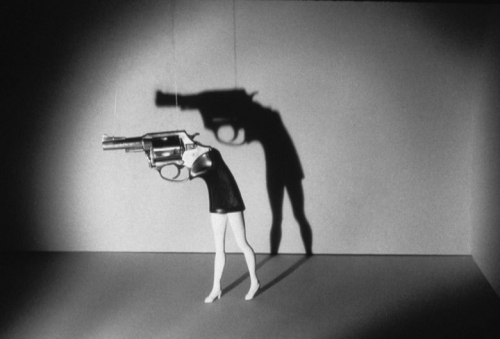
My Life Had Stood - A Loaded Gun is another popular and anthologized poem by Emily Dickinson. In this poem the narrator admits that her life has been a loaded gun. It is an extremely striking image which perhaps, conveys the explosive potential of the narrator. The loaded gun has been kept in a corner of her apartment. The implication, perhaps, is that the explosive potential of the protagonist has remained confined to a small corner of her apartment. She has had no opportunity to realize her potential in all its fullness. One can also safely affirm that there is something dangerous, something fierce about the protagonist. She is not an ordinary, conventional woman of nineteenth century New England.
her life felt like a loaded gun, unused and set aside in a corner until one day the gun's owner came in, noticed her there and took away.
The second phase of the poem indicates a kind of change in the protagonist's life style. She is chosen by her Master. She is also carried away from the narrow confines of her apartment. They live a life of freedom. They roam freely in the woods. They hunt the doe. When she speaks to her Master, her voice is echoed by the mountains.
When she smiles, the whole valley projects the rightness and sheen. It seems that as the pleasure of companionship bursts out of her face and looks like Vesuvius, a volcano in Italy full of pent-up lava.
When night comes and the
day is over, the dedicated protagonist guards her Master. She acts like a
vigilant watchman. The protagonist says that she is a deadly foe to any intruder who may
dare to harm her Master. This duty is more fulfilling than sleeping beside
him and sharing a pillow
She is dangerous to his enemies because I kill them on the first try. She aims through the barrel of gun and If she can spot the guy, she would release the trigger of the gun and shoot him dead.
Such a deadly shot that from the protagonist as the intruder has no chance to escape. He dies. The protagonist, however, says at the end that He (perhaps the Master) is more likely to live longer than her. It would be better that he lives longer than the protagonist. It is true that the protagonist can press the trigger of the gun and kill but she does not have the willingness and the power to accept death.
the gun is a powerful metaphor here it symbolises the powerful words and verses of the speaker. The vehemence of her verses are indeed destructive. The spirit of feminism runs through the stanzas as the speaker highlights and assert her power and demand for an action against the subjugated life. Her life was earlier restricted in the corners later on she explored a space of her own.
No comments:
Post a Comment
looking forward your feedbacks in the comment box.